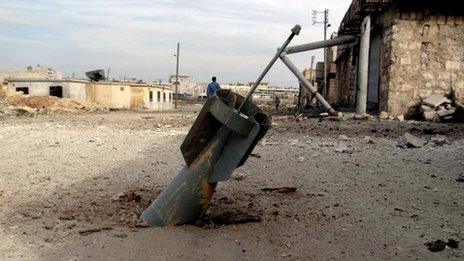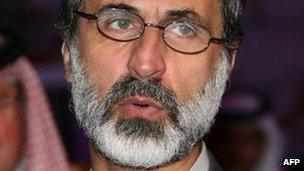Rome talks unlikely to break Syria conflict deadlock
- Published

The Syrian opposition's unexpected offer to hold talks with regime representatives was interpreted by some as a sign of weakening strength
Whatever exactly emerges from the Friends of Syria meeting in Rome on Thursday, one thing is clear: the parameters of the Syrian conflict - a brutal, slow-moving slugging-match on the ground, and deadlocked international diplomacy - have not changed, nor are they likely to for some time.
The initiative - perhaps gesture would be a better word - launched by the opposition Syrian National Coalition leader Moaz al-Khatib at the end of January had stirred some perhaps unrealistic excitement that some kind of settlement dialogue between regime and opposition might be possible.
He had offered to hold talks with regime representatives anywhere outside the country, provided the Damascus government released 160,000 prisoners and renewed the passports of dissidents abroad.
That was a sharp break from the opposition mantra that there could be no negotiation with the regime before President Bashar al-Assad and his top aides left power (and preferably the country).
It caused ill-concealed consternation in unprepared opposition circles. It also gave hope to the regime - and its Russian allies - that the opposition was tiring, feared it might lose the war, and was ready to come to terms.
With both the Syrian Foreign Minister, Walid al-Muallim, and Mr Khatib himself at that time about to go to Moscow, his opposition colleagues clearly feared - and the Russians hoped - that he might somehow get drawn into a dialogue of some sort with Damascus, with no knowing where it might lead.
If that were ever on the cards, Mr Khatib's move - described by a senior diplomat as "the scream of an honest man who really feels for his country" - is now clearly not heading in that direction.
Bitter diatribe
Policy decisions adopted by the full leadership of the opposition Coalition, meeting in Cairo last week, set "fundamental parameters" for any political process, including this :
"The removal of Bashar al-Assad and all of the security and military leadership responsible for the decisions that have destroyed the country and terrorised its people. These individuals do not fall within the confines of any political framework and will not be a part of this political solution. They must be held accountable for their crimes."
With the regime clearly in no mood to negotiate its own demise, that alone was enough to scupper any possible solo move by Mr Khatib.
But the Coalition leadership went further, and announced that participation in the Friends of Syria meeting in Rome, and Mr Khatib's proposed visits to both Moscow and Washington, were being called off.
Boycotting the Rome meeting of their own international support club would clearly have been stunningly self-defeating, and that decision was duly rescinded, as expected, after unspecified blandishments from the new US Secretary of State, John Kerry.

Mr Khatib is likely to be kept on a tight leash if he meets Russian officials in Moscow
But the visit to Moscow (and theoretically Washington) remains on the spike. If Mr Khatib does eventually go to see the Russians on their home turf, he will clearly be travelling on a very tight leash.
That prompted a bitter diatribe from the Russian Foreign Minister, Sergei Lavrov.
"A few days ago it seemed that conditions for the sides to sit down for talks ... were getting clearer," he said.
"But then came denials of such an approach. It seems extremists, who bet on a military solution to Syria's problems and block initiatives to start dialogue, have for now come to dominate in the ranks of the Syrian opposition, including in the so-called (Syrian) National Coalition."
Mr Lavrov's deputy, Gennady Gatilov, also lashed out at the opposition's western supporters.
"Our western partners ... have to some degree encouraged (the opposition) to continue the armed fight," he said.
Western diplomats would put the blame the other way round - on Moscow, for persisting in its attachment to President Assad, resisting calls for him to go, and blocking an international consensus at the Security Council.
"Our position remains that there can be no credible negotiation with the regime while Assad is in place," said one.
"All its talk of dialogue is not sincere. The regime has not taken a strategic decision to compromise."
So, like previous Friends of Syria meetings, the Rome one is highlighting and aggravating the chasm between the opposition's western-led supporters and the regime's Russian, Chinese and Iranian backers.
Empty promises?
But it has also shown up differences within the opposition coalition.
The Syrian National Council, which was the original opposition umbrella group until it was subsumed into the Coalition in Qatar last November, is sticking by the decision to stay away from the Rome meeting, voicing scepticism about the sincerity of the inducements offered.
"There is no change in the Russian or American positions," said one SNC official.
"Obama will not approve the supply of arms to the opposition, we know that for sure. It's promises as before, and promises remain promises."
Rather than risk shooting itself in the foot in a major way, the broader Coalition had little choice but to do a U-turn and attend the Rome meeting, though its initial rejection succeeding in winning US attention and perhaps impressing on supporting nations that words are not enough as the carnage intensifies.
John Kerry: "The Syrian people deserve better than the horrific violence that invades and threatens their everyday lives"
"It's important the coalition be part of it, as the best way of putting the regime on the back foot," said one western diplomat.
Few expect the Rome meeting to produce a sudden lurch in the US position towards supplying the opposition directly with arms.
Washington could signal a discreet green light for its allies in the region to do so, though it's believed that they already are, buying arms from Croatia and elsewhere for delivery to the Syrian rebels.
Humanitarian and practical aid are expected to be stepped up, with the emphasis on rapid delivery rather than pledges.
Above all, the opposition's western backers want it to come out of the meeting looking cohesive and with enhanced international backing, in the hope of persuading the Russians that the game is nearly up and it is time to sacrifice President Assad in order to salvage something of the existing order.